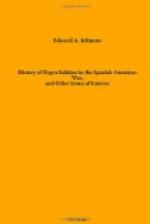“Then, with two flags flying above him, and two heavy staves to bear, this powerful negro (he is literally a giant in strength and stature) charged the heights, while white men and black men cheered him as they pressed behind. Who shall say what temporary demoralization there may have been in this troop of the Third at that critical moment, or what fresh courage may have been fired in them by that black man’s act! They say Berry yelled like a demon as he rushed against the Spaniards, and I, for one, am willing to believe that his battle-cry brought fighting energy to his own side as well as terror to the enemy.”
“After the fight one of the officers of the Third Cavalry sought Berry out and asked him to give back the trophy fairly won by him, and his to keep, according to the usages of war. And the big Negro handed back the banner with a smile and light word. He had saved the colors and rallied the troop, but it didn’t matter much. They could have the flag if they wanted it.”
“There are some hundreds of little things like this that we might as well bear in mind, we white men, the next time we start out to decry the Negro!”
* * * * *
PRESIDENT MCKINLEY RECOGNIZES THE WORTH OF NEGRO SOLDIERS BY PROMOTION.
PROMOTIONS FOR COLORED SOLDIERS.
Washington, July 30.—Six colored non-commissioned officers who rendered particularly gallant service in the actions around Santiago on July 1st and 2d have been appointed second lieutenants in the two colored immune regiments recently organized under special act of Congress. These men are Sergeants William Washington, Troop F, and John C. Proctor, Troop I, of the 9th Cavalry, and Sergeants William McBryar, Company H; Wyatt Hoffman, Company G; Macon Russell, Company H, and Andrew J. Smith, Company B, of the 25th Infantry, commanded by Colonel Daggett. Jacob C. Smith, Sergeant Pendergrass, Lieutenant Ray, Sergeant Horace W. Bivins, Lieutenant E.L. Baker, Lieutenant J.H. Hill, Lieutenant Buck.—N.Y. World.
These promotions were made into the volunteer regiments, which were mustered out after the war, thus leaving the men promoted in the same rank they were before promotion if they chose to re-enlist in the regular army. They got no permanent advancement by this act of the President, but the future may develop better things for them.
* * * * *
COMPETENT TO BE OFFICERS—THE VERDICT OF GENERAL THOMAS J. MORGAN, AFTER A STUDY OF THE NEGRO’S QUALITY AS A SOLDIER.
COLOR LINE IN THE ARMY—DIFFICULTY IN MAKING AFRO-AMERICAN COMMISSIONED OFFICERS—HEROISM ON THE FIELD SURE TO REAP REWARD—MORGAN PREFERS NEGRO TROOP TO THE WHITES.
General Thomas J. Morgan belongs to that class of Caucasian observers who are able to think clearly upon the Negro problem in all of its phases, and who have not only the breadth of intelligence to form just and generous opinions, but who possess that rarer quality, the courage to give them out openly to the country. General Morgan contributes the following article to the New York Independent, analyzing the motives which underlie the color line in the army.




